
FACULTY OF ARTS AND SCIENCES
Department of Sociology
SOC 410 | Course Introduction and Application Information
| Course Name |
Myths, Beliefs and Thoughts in History
|
|
Code
|
Semester
|
Theory
(hour/week) |
Application/Lab
(hour/week) |
Local Credits
|
ECTS
|
|
SOC 410
|
Fall/Spring
|
3
|
0
|
3
|
6
|
| Prerequisites |
None
|
|||||
| Course Language |
English
|
|||||
| Course Type |
Elective
|
|||||
| Course Level |
First Cycle
|
|||||
| Mode of Delivery | - | |||||
| Teaching Methods and Techniques of the Course | DiscussionQ&ALecture / Presentation | |||||
| Course Coordinator | - | |||||
| Course Lecturer(s) | ||||||
| Assistant(s) | - | |||||
| Course Objectives | The principal purpose of this course is to provide the students through myths with a deep and analytical understanding on the beliefs, values and thoughts of the ancient world. The course will enable them to gain a cognitive and analytical approach in extracting historical facts from the ancient literary sources as it also offers a ground for discussion. |
| Learning Outcomes |
The students who succeeded in this course;
|
| Course Description | Intersecting Mythology and History this course highlights the crucial role of the myths as one of the basic tools in the study of antiquity, revealing eternal truths about the nature of man, relationships between man and man, man and society, and man and the divinities. The course attempts to illuminate the religious beliefs, moral values, social customs and early rational thoughts peculiar to the archaic world with special emphasis on Greek mythology and philosophy. This will be related through a cognitive, analytical and comparative approach under the light of the ancient literary sources. |
|
|
Core Courses | |
| Major Area Courses |
X
|
|
| Supportive Courses | ||
| Media and Management Skills Courses | ||
| Transferable Skill Courses |
WEEKLY SUBJECTS AND RELATED PREPARATION STUDIES
| Week | Subjects | Related Preparation |
| 1 | Introduction: Definition of myth and the relation between mythology and history as two distinct disciplines | G. S. Kirk, Myth: Its Meaning and Functions in Ancient & Other Cultures (Cambridge: Cambridge Univ. Press), 1998. |
| 2 | Nature of Myth: Its meaning and function in ancient cultures | G. S. Kirk, Myth: Its Meaning and Functions in Ancient & Other Cultures (Cambridge: Cambridge Univ. Press), 1998 |
| 3 | Themes: Creation, Fertility and Heroic myths and common beliefs and thoughts lying behind them | Mircae Eliade, Dinsel İnançlar ve Düşünceler Tarihi I, çev. Ali Berktay (İstanbul: Kabalcı Yay.), 2000; G. S. Kirk, Myth: Its Meaning and Functions in Ancient & Other Cultures (Cambridge: Cambridge Univ. Press), 1998 |
| 4 | Myth and society in archaic world: Mesopotamia and Egypt | Donna Rosenberg, World Mythology, Chicago, 1986; Mircae Eliade, Dinsel İnançlar ve Düşünceler Tarihi I, çev. Ali Berktay, İstanbul, 2000; |
| 5 | Greek mythology and polytheism: Homeros and Hesiodos | G. S. Kirk, The Nature of the Greek Myths, London, 1990. |
| 6 | Midterm exam I | |
| 7 | Homeros: Readings of selected passages from Iliad and Odysseia On religious beliefs and social values | Homeros, Iliad, tr. by A. T. Murray, Cambridge, 1999. Homeros, Odyssey, tr. by A. T. Murray, Cambridge, 1995. |
| 8 | Hesiodos: Readings of selected passages from Theogonia on Universe, creation and religion | Hesiodos, Theogonia, tr. By Norman O. Brown, New York, 1953. |
| 9 | From Myths to Philosphy: Discussion on the socioeconomic basis of the transition from from mythdominated understanding to rational thought. | G. S. Kirk, Myth: Its Meaning and Functions in Ancient & Other Cultures (Cambridge: Cambridge Univ. Press), 1998. |
| 10 | The early intellectual and philosophical movements in Greece: the approach of Milesian School | Jonathan Barnes, Early Greek Philosophy, London, 1987 |
| 11 | Midterm exam II | |
| 12 | The essence of the Sophist philosophy and its basic concepts on religion and ethics, Thoughts from Sokrates and Aristotales, Society and State in Plato | Jonathan Barnes, Early Greek Philosophy, London, 1987 |
| 13 | Epicurean approach to life Equalitarianism, pacifism and humanitarianism in Stoicism | Jonathan Barnes, Early Greek Philosophy, London, 1987 |
| 14 | General Discussion and Evaluation | |
| 15 | Review of the Semester | |
| 16 | Review of the Semester |
| Course Notes/Textbooks | The related chapters in the mentioned books |
| Suggested Readings/Materials |
EVALUATION SYSTEM
| Semester Activities | Number | Weigthing |
| Participation | ||
| Laboratory / Application | ||
| Field Work | ||
| Quizzes / Studio Critiques | ||
| Portfolio | ||
| Homework / Assignments |
1
|
30
|
| Presentation / Jury | ||
| Project | ||
| Seminar / Workshop | ||
| Oral Exams | ||
| Midterm |
1
|
30
|
| Final Exam |
1
|
40
|
| Total |
| Weighting of Semester Activities on the Final Grade |
4
|
60
|
| Weighting of End-of-Semester Activities on the Final Grade |
1
|
40
|
| Total |
ECTS / WORKLOAD TABLE
| Semester Activities | Number | Duration (Hours) | Workload |
|---|---|---|---|
| Theoretical Course Hours (Including exam week: 16 x total hours) |
16
|
3
|
48
|
| Laboratory / Application Hours (Including exam week: '.16.' x total hours) |
16
|
0
|
|
| Study Hours Out of Class |
15
|
4
|
60
|
| Field Work |
0
|
||
| Quizzes / Studio Critiques |
0
|
||
| Portfolio |
0
|
||
| Homework / Assignments |
1
|
20
|
20
|
| Presentation / Jury |
0
|
||
| Project |
0
|
||
| Seminar / Workshop |
0
|
||
| Oral Exam |
0
|
||
| Midterms |
1
|
20
|
20
|
| Final Exam |
1
|
32
|
32
|
| Total |
180
|
COURSE LEARNING OUTCOMES AND PROGRAM QUALIFICATIONS RELATIONSHIP
|
#
|
Program Competencies/Outcomes |
* Contribution Level
|
||||
|
1
|
2
|
3
|
4
|
5
|
||
| 1 | To have the knowledge of classical and contemporary theories in sociology, and be able to comparatively analyze these theories. |
|||||
| 2 | To have the knowledge of main methodological approaches in sociology as well as social research and data analysis methods. |
X | ||||
| 3 | To have knowledge in the fields of general sociology, sociology of institutions, social structure and change, and applied sociology. |
X | ||||
| 4 | To be able to determine the appropriate methods in the design of the planning stage and conclusion of a sociological project, individually or as part of a team. |
X | ||||
| 5 | To be able to diagnose the social dynamics behind personal problems by using sociological imagination. |
X | ||||
| 6 | To be able to define social problems at local, national, and global level, and offer new policies for solutions. |
|||||
| 7 | To be able to apply commonly-used computer programs for data collection and analysis in sociological research. |
X | ||||
| 8 | To be able to develop a socially responsible, scientific and ethical perspective regarding the collection, analysis, interpretation and presentation of data. |
|||||
| 9 | To be able to analyze different aspects of the social world by drawing on the knowledge produced by other disciplines of the social sciences. |
X | ||||
| 10 | To be able to constantly renew herself/himself professionally by following scientific and technological developments in sociology and social research. |
X | ||||
| 11 | To be able to collect sociological data and communicate with sociologists and other social scientists in a foreign language ("European Language Portfolio Global Scale", Level B1). |
|||||
| 12 | To be able to speak a second foreign at a medium level of fluency efficiently. |
|||||
| 13 | To be able to relate the knowledge accumulated throughout the human history to their field of expertise. |
X | ||||
*1 Lowest, 2 Low, 3 Average, 4 High, 5 Highest
NEWS |ALL NEWS
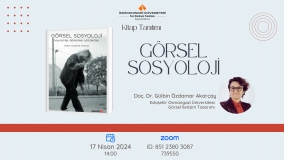
Book Presentation and Talk: Visual Sociology
Department of Sociology invites you to the Book Presentation and Talk event with Gülbin Özdamar Akarçay, the author of “Visual Sociology". Date:
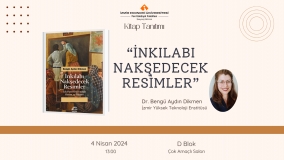
Book Presentation and Talk: Painting the Revolution
Department of Sociology invites you to the Book Presentation and Talk event with Dr. Bengü Aydın Dikmen, the author of “Painting the
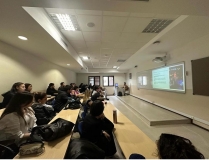
We welcomed ethnomusicologist Onur Sönmez.
We held our sociology seminar where we hosted ethnomusicologist Onur Sönmez. We thank him very much for this detailed and interesting presentation.
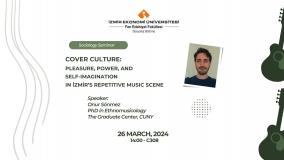
Cover Culture: Pleasure, Power, and Self-Imagination in İzmir’s Repetitive Music Scene
You are cordially invited to the Sociology Seminar where we will host Dr. Onur Sönmez. Onur Sönmez has a PhD in ethnomusicology
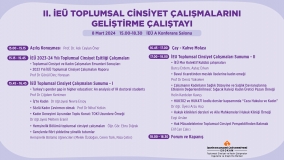
II. IUE GENDER STUDIES DEVELOPMENT WORKSHOP (EKOKAM- Gender and Women’s Studies Research and Application Center)
Research Assistant Helin Kardelen Kavuş attended the “II. IUE Gender Studies Development Workshop” on March 8, 2024, International Women's Day. Organized by EKOKAM, the workshop
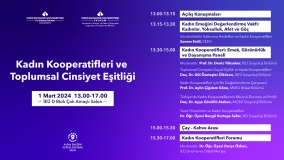
Women’s Cooperatives and Gender Equality
You are cordially invited to "Women's Cooperatives and Gender Equality", which will be co-organized by IUE EKOKAM, the Department of Sociology, and
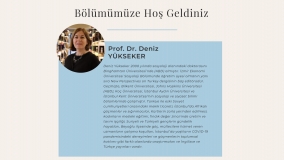
Welcoming Our New Faculty Member: Professor Deniz Yükseker
We are proud to welcome and introduce our newest faculty member: Professor Deniz Yükseker. We wish her all the best and success
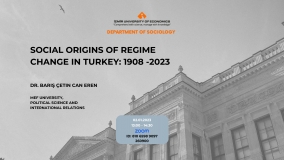
Sociology Seminar: Social Origins of Regime Change in Turkey: 1908 -2023
Department of Sociology cordially invites you to a seminar on "Social Origins of Regime Change in Turkey: 1908 - 2023" by Dr.



